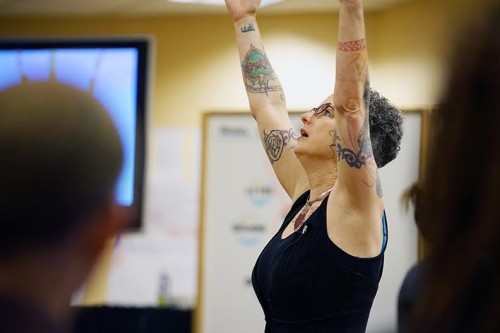This week, in the city of Atlanta, Auburn Theological Seminary is hosting its biennial “convening of faith and moral leaders.” The event is called “MountainTop” and is described as a summit that “advances a multifaith movement for justice.” In 2013, we reported on the last summit, held in Nashville. In that article, we featured a conversation with Aline (Macha) O’Brien, who was one of the four Pagan participants at that year’s event. For the 2015 conference, I was able to sit down live with a group of six women, during their lunch hour, to talk about the process of MountainTop. The event began Monday morning, June 8, and will continue through Wednesday. I caught the women halfway through the entire experience. And, after that conversation, I can safely say that is exactly what it is: an experience.
For the 2015 conference, I was able to sit down live with a group of six women, during their lunch hour, to talk about the process of MountainTop. The event began Monday morning, June 8, and will continue through Wednesday. I caught the women halfway through the entire experience. And, after that conversation, I can safely say that is exactly what it is: an experience.
Activist and Priestess Courtney Weber, who works for Auburn, explained, “MountainTop is not like typical conventions. We don’t have an agenda and program to choose from different workshops and presentations. We are coming together for one very specific reason.”
This year, that reason is racial justice.
In 2013, Auburn focused widely on social justice in general, which is part of the organization’s overall mission. However, after the event was over, organizers felt that the convention needed to focus on a single aspect of social justice. Weber noted that “it felt like there were too many cooks in the kitchen.” Therefore, in 2014, the organization chose a single directive. Reverend Doctor Katharine Rhodes Henderson, Auburn Seminary’s president explained:
We have witnessed the most recent acts of brutality unleashed on the bodies of black and brown men, women and children … Now is the time for leaders of faith and moral courage to work together to hold ourselves and our nation accountable to healing this oldest and still festering wound within our national body. What this healing looks like, and the particular work we are called to do is what will engage us over the next three days.
Weber added that, when Ferguson happened, the 2015 event was already being planned. However, those events and others only confirmed the need for this specific work. Because the seminary is based in New York, Weber said that the “Eric Garner story was a particularly painful moment for Auburn.” When news broke, they “sat in silence” for a long time.
![Andrea Weston, Courtney Weber, Caitlin Breedlove, Luna Pantera, T. Thorn Coyle, Sabrina Hayeem-Ladani [Courtesy Photos]](https://wildhunt.org/wp-content/uploads/2015/06/Presentation1-500x82.jpg)
Andrea Weston, Courtney Weber, Caitlin Breedlove, Luna Pantera, T. Thorn Coyle, Sabrina Hayeem-Ladani [Courtesy Photos]
The six women activists included: Radio Host and Rootworker Andrea Weston, Priestess Courtney Weber, Author T. Thorn Coyle, Priestess Luna Pantera, Art and Ritual Specialist Sabrina Hayeem-Ladani and Co-Director of Southerners on New Ground, Caitlin Breedlove.
The first question I asked them is why they got involved with this particular conference. There are many interfaith opportunities all over the country, and many organizations through which to work on social justice causes. Why this one?
Since Weber and Hayeem-Ladani work for Auburn, both were there as employees and participants. Weber specifically said that she had wanted to attend the 2013 MountainTop, but was unable to take the time off from her previous job. However, shortly after that event, Weber accepted a position with Auburn. Now she is not only a participant, but also one of the organizers.
Of this particular conference, Weber said, “After PantheaCon, I was lost and asking ‘How can I help this work?’ ” She was referring to the many very public conversations addressing racial justice during the February Pagan conference. Weber believes that by working on MountainTop and by helping to bring Pagan social justice activists to the table, she is doing her part for the bigger picture.
Pagan attendees include Luna Pantera, Caitlin Breedlove and T. Thorn Coyle. When asked why she accepted the invitation, Pantera said, “I was activist but got burned out. [But] my daughter lives near where Tony Robinson was shot and killed. For me, I needed to get back into the movement and to get over my biases, which I do have, against Christianity.” Pantera added that MountainTop has provided “good fuel to get back” into the process.
Coyle simply said, “Something inside me pulled me.” She had to come. Longtime activist, Coyle has become increasingly active in various racial justice movements in her home state of California. She said, “I’m moving more and more in that direction.” Like Coyle, Weston, also simply said, “I need to be here.”
Breedlove, who attended the 2013 event, was back for more. She described the difference between this convention environment and others, saying “MountainTop isn’t brittle and tight.” Even when discussions become tense and there is disagreement, the space is safe, because it is “built on principles.” She added that “its grounded and has soul.” Weston agreed, calling the space “sacred.”
This sense of grounding is evident as I sat there talking to the group. Despite being surrounded by the typical markers of a stale business conference, such as white boards and offices chairs, everyone seemed comfortable and the energy was flowing. The entire participating crowd seemed eager to engage with each other.

T. Thorn Coyle leading a worship session.
Coyle noted that one way Auburn promotes this fluid environment is through the engagement of the body and voice. Song and movement are encouraged in both daily problem solving and conversation. For example, when Coyle was asked to host one of the daily worship sessions, she was given two directions: make the session no more than 10 minutes long and engage the body.
While I was there, artist Yara Allen stood up and led the entire group in an inspirational song. This was followed by another song led by a different person. This marked the end of lunch, and help transitioned the group back into the work sessions.
Coyle said Auburn’s purpose is to “lead us toward creative problem-solving and creative visioning.” She added that the coordinators periodically remind the group of these goals throughout the day.
The methodologies used in creating this unique framework were developed by ImaginalLabs. I was able to briefly speak with co-founder Rob Evans, who explained that they are “applying the principle of design thinking to social justice.” This work is based on the company’s “DesignShop” process and includes a 3-tier trajectory. In this case, the 3 tiers are defined as vision, strategy and action. Each tier becomes the focus of one day’s work.
Evans added that this process provides a group of people with a “revolutionary approach to old issues” in hopes of finding new solution. It also allows for effective collaboration within diverse groups of “people who don’t typically work together or work creatively.”
Each day is structured around small groups, or containers, who are given a specific task. Those small groups change throughout the conference in order that everyone gets to work with a variety of a people. Within those “container” session, the members confront fictional situations, discuss the problems that led to the situation, and look for solutions. Then, each small group presents the outcome to the entire conference.
Coyle relayed one of her experiences from a Tuesday morning session. She said, “The non Pagans invoked a Witch’s cauldron into our sketch on justice – brewing up a cauldron filled with visions of justice, in order to feed one another with love … By our final session on Tuesday, we sat in concentric circles, weeping, because the Truth in the room was so strong.”
![Caitlin Breedlove [Courtesy Auburn Seminary]](https://wildhunt.org/wp-content/uploads/2015/06/unnamed-6-500x333.jpg)
Caitlin Breedlove [Courtesy Auburn Theological Seminary]
The group continued on to say that everyone at MountainTop either leaves their baggage at the door, or is ready to confront it. Each person enters with an open heart and mind, and is ready to listen and work. Pantera added that here she can safely say, “Thank you for allowing me to have my process.”
Tomorrow we continue this discussion as the women reflect on those personal challenges faced while in this setting, as well as their goals for taking this work back to their own communities.
[To be continued…]
The Wild Hunt is not responsible for links to external content.
To join a conversation on this post:
Visit our The Wild Hunt subreddit! Point your favorite browser to https://www.reddit.com/r/The_Wild_Hunt_News/, then click “JOIN”. Make sure to click the bell, too, to be notified of new articles posted to our subreddit.
Heather I’m so glad you were able to come by! And I thank Courtney for her invitation to this powerful conference. One minor correction: I’ve been an activist since my teens, and engaged with issues of police brutality, incarceration and racial justice actively since 2012.
I’m only disappointed that I didn’t get to see more and talk to all of you longer. And, thanks for adding in that detail about your work.
Heather, thank you so much for the work you do with WH. I also wish we’d had more time. The conference was a tremendous experience.
Wow! Looking forward to the next installment.